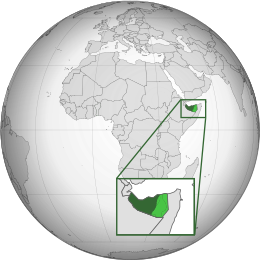Commons:Copyright rules by territory/Somaliland
|
Copyright rules: Somaliland Shortcut: COM:SOMALILAND | |
 | |
 | |
| Durations | |
|---|---|
| Standard | Life + 30 years |
| Other | |
| Common licence tags | {{PD-Somaliland}} |
| Treaties | |
| URAA restoration date* | Not recognized |
| *A work is usually protected in the US if it is a type of work copyrightable in the US, published after 31 December 1928 and protected in the country of origin on the URAA date. | |
Somaliland is a self-declared sovereign state in the Horn of Africa, internationally considered to be part of Somalia.
Background
[edit]In the late 19th century the British empire established the colonies of British Somaliland. Italian occupation lasted until 1941, when a British military administration took over. In 1949 Italian Somaliland became a United Nations Trusteeship under Italian administration. The two regions united on 1 July 1960 to form the independent Somali Republic. On 18 May 1991 the former British Somaliland unilaterally declared independence from Somalia.
Copyright in British Somaliland was covered by the 1911 Copyright Act, which was superseded by the Copyright Act 1956. Italian laws covered Italian Somaliland. These two sets of laws remained in force in the respective regions until the Somali Democratic Republic passed the first Copyright Law, Law No. 66 of 7 September 1977, which repealed the contrary provisions of the 1956 act.[1] The 1977 law does not appear to have been widely used or enforced, and it is unclear whether it is relevant to the breakaway state of Somaliland.[1]
Somaliland and Somalia are not signatory to the Berne Convention or any treaty with the United States, so works from Somaliland may be freely used in the United States. To qualify for Wikimedia Commons they must also be free of copyright in Somaliland. Given the uncertain status, under the precautionary principle they must be free of copyright under the law of Somalia and the law of Somaliland.
General rules
[edit]According to the 1977 Copyright Law - Law No. 66 of 7 September 1977, Somali law includes copyright protection only for registered works. However, there is no longer anywhere to register copyrights. There are records of a copyright office existing prior to being destroyed in the civil war in 1991. Durations were:[2]
- The copyright of (registered) literary and artistic and scientific works shall be protected during the life of the author and for a further period of 30 years after his death.[6/1977 (Art.24)]
- In the case of joint works, the copyright shall be protected up to 30 years after the death of the last surviving author.[6/1977 (Art.24.2)]
- Works whose authors are not known or were published anonymously or under pseudonyms shall enjoy protection from the date when the unknown name or the real name of the author is found in the Copyright Register.[6/1977 (Art.25)]
- Works undertaken after the death of an author shall enjoy protection from the date of their publication.
Treaty status
[edit] |
Per U.S. Circ. 38a, the following countries are not participants in the Berne Convention or Universal Copyright Convention and there is no presidential proclamation restoring U.S. copyright protection to works of these countries on the basis of reciprocal treatment of the works of U.S. nationals or domiciliaries:
As such, works published by citizens of these countries in these countries are usually not subject to copyright protection outside of these countries. Hence, such works may be in the public domain in most other countries worldwide. However:
Somaliland has no effective copyright protection, active copyright protection, or international copyright treaties. According to the 1977 Copyright Law - Law No. 66 of 7 September 1977, the law of internationally recognized Somalia includes copyright protection for registered works. However, there is no longer anywhere in Somaliland to register copyrights. There are records of a copyright office existing prior to being destroyed in the civil war in 1991. |
Copyright tags
[edit]
See also: Commons:Copyright tags
Freedom of panorama
[edit]
See also: Commons:Freedom of panorama
- De facto:
 Unsure. See also: Commons:Copyright rules by territory/Somalia#Freedom of panorama.
Unsure. See also: Commons:Copyright rules by territory/Somalia#Freedom of panorama.
See also
[edit]Citations
[edit]- ↑ a b Somaliland Copyright Law. Somaliland Law.com (2018). Retrieved on 2018-12-09.
- ↑ Somali Democratic Republic Copyright Law 1977: Law No. 66 of 7/9/1977 (in Somali). Retrieved on 2020-12-21.